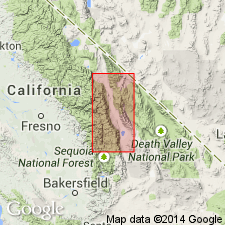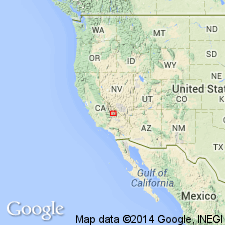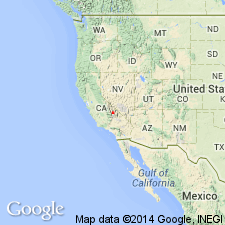
- Usage in publication:
-
- Owenyo limestone*
- Modifications:
-
- Original reference
- Dominant lithology:
-
- Limestone
- AAPG geologic province:
-
- Great Basin province
Summary:
Owenyo limestone. Mainly massive grayish crystalline to compact limestones. Basal 2 feet blue-gray compact limestone carrying irregular lenses and stringers of sandstone, whose grains were apparently derived from underlying Reward conglomerate. Here and there, particularly in upper third, are layers carrying rounded chert pebbles. Thickness 125 feet. The limestones carry a Permian (SPIRIFERINA PULCHRA) fauna throughout, and according to G.H. Girty are probably to be correlated in part with Park City, Phosphoria, and Embar formations of Utah, Idaho, and Wyoming. Only two exposures of Owenyo limestone are known, both of which lie between Reward Mine and Union Wash. One shows the base and the other the top of the formation. It is unconformably overlain by Lower Triassic shales and unconformably underlain by Reward conglomerate. Age is Permian.
Named from exposures about 3.5 mi north of Owenyo Station on the Southern Pacific RR, between Union Wash (first large canyon to north) and Reward Mine, [Inyo Mountains, NE/4 Union Wash 7.5-min quadrangle, Inyo Co.], eastern CA.
Source: US geologic names lexicon (USGS Bull. 896, p. 1580).

- Usage in publication:
-
- Owenyo limestone member*
- Modifications:
-
- Revised
- AAPG geologic province:
-
- Great Basin province
Summary:
Pg. 8, 10. Owenyo limestone member of Owens Valley formation. Reduced to member status in Owens Valley formation (new). Age is Permian.
Source: US geologic names lexicon (USGS Bull. 1200, p. 2880).

- Usage in publication:
-
- Owenyo Limestone Member†
- Modifications:
-
- Abandoned
- AAPG geologic province:
-
- Great Basin province
Summary:
Pg. 10. †Owenyo Limestone Member of Owens Valley Formation abandoned. Present only in Reward Mine-Union Wash area, [in NE/4 Union Wash 7.5-min quadrangle, Inyo Co., central CA]. Lower part of member transferred to Upper Permian Conglomerate Mesa Formation of Owens Valley Group. Upper part of member included in overlying unnamed Lower and Middle(?) Triassic sequence.
Source: Publication.
For more information, please contact Nancy Stamm, Geologic Names Committee Secretary.
Asterisk (*) indicates published by U.S. Geological Survey authors.
"No current usage" (†) implies that a name has been abandoned or has fallen into disuse. Former usage and, if known, replacement name given in parentheses ( ).
Slash (/) indicates name conflicts with nomenclatural guidelines (CSN, 1933; ACSN, 1961, 1970; NACSN, 1983, 2005, 2021). May be explained within brackets ([ ]).

